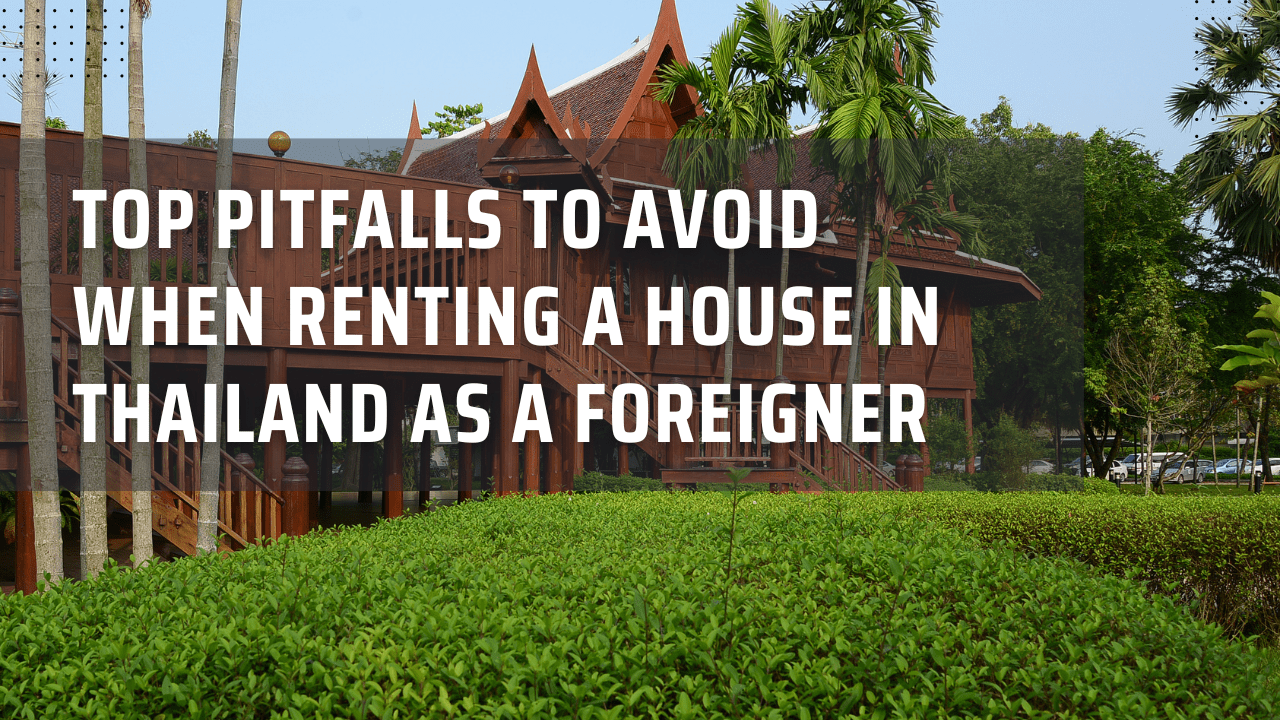Renting a house in Thailand as a foreigner can be a daunting experience, especially if you are unfamiliar with the local laws and customs. To ensure a smooth and stress-free rental experience, it is essential to be aware of common pitfalls and how to avoid them. This post will explore the top pitfalls to avoid when renting a house in Thailand as a foreigner.
From confusing condos and apartments to negotiating with landlords and checking for damages, this guide will provide you with valuable tips to help you make informed decisions and protect your rights as a tenant.
Whether you are a first-time renter or a seasoned ex-pat, this post is a must-read for anyone looking to rent a house in Thailand.
Take your time reading this list of 10 things to be aware of when renting in Thailand, we cover each one in detail along with a Pro Tip for you to consider when renting.
1.
Confusing Condo Rentals for Apartment Rentals
While these two terms are often interchanged, in Thailand, Condos, and apartments are not the same type of real estate. Condos can be owned and rented by individual house owners. Apartments, however, are owned and rented by 1 rental company.
Condo rentals work out best for rentals looking for affordable housing. This is because apartment rental companies often charge large premiums on essential utilities such as water and electricity.
Pro Tip – Consider renting a sustainable condo unit to save further on utilities as these units run on renewable energy sources that cut down on utility bills. If you want to know more about sustainable housing then do read the blog, A Guide To Eco-Friendly Housing in Thailand.
2.
Paying a Higher Rent Amount Than Needed
Before renting a house in Thailand as a foreigner understanding the price structure for rentals is crucial. Many landlords may over-quote foreigners as they have a higher purchasing power. Cities like Bangkok are relatively expensive to rent out while places like Chiang Mai are relatively affordable. The concept of negotiations still works in Thailand.
Depending on the place you wish to rent out, by negotiating directly or through a realtor you can save a pretty penny on the original quotation by dealing now or through a realtor.
Pro Tip – Ensure that you only agree to pay for rent and utilities as other fees like building management and building management fees are to be paid by the house owner, not the tenants.
3.
Moving In Without A Written Contract In Place
Not having a contract in place while renting a house in Thailand can be a potential issue as, at the end of the day, the house owner has the legal right to evict tenants, especially without a written contract in place.
Foreigners can legally rent the property while on a travel visa provided a prerequisite condition is met. The condition is that the visa should be used within 90 days of issue which allows an initial 60 days of stay. Such visas can also be extended, and foreigners with a non-immigrant B Visa can choose to stay for longer durations as well. As a general rule to safeguard your interests, always choose to have a contract in place, the contract should mention all discussed terms in writing and should be signed by both parties, that is the house owner and the tenant.
Pro Tip – The contract you sign should be preferably bilingual in Thai and English and should be checked by at least you if not additionally by your realtor or a property solicitor as well.
4.
Deposit and Damages
Typically, landlords in Thailand ask for 2 months of rent as a security deposit for renting houses and the first month’s rent is usually paid in advance. Some landlords may also ask for an advance notice in writing of 30 days from the date the tenant wishes to leave the house.
Any damages to the walls, including hammering nails on the walls will be charged extra at the time of exiting the house. Additionally, some landlords may insist on cleaning and painting charges for tenants who have stayed for a year or more.
Pro Tip – Check the house for signs of leakage before you agree to rent it. This is important as Thailand sees a minimum of 4 months of heavy rain every year. If an existing leakage occurs then this can lead to damages and a reduction of the deposit refund amount.
5.
Adding Fixtures That Can Lead To Damages and Subsequent Penalties
When renting a house in Thailand, landlords often require a security deposit of two months’ rent and the first month’s rent paid in advance. Additionally, some landlords may require written 30 days’ notice prior to moving out.
While it may be tempting to add fixtures such as shelves and pictures to personalize your rented space, be aware that any damages caused by hammering nails into the walls will result in additional charges when you move out. These penalties can include the cost of repairs to the walls and may even extend to cleaning and painting charges, particularly for those who have stayed in the rental property for a year or more.
To avoid these additional charges, consider alternative ways to personalize your living space that do not involve damaging the walls. For example, you could use adhesive strips or hooks designed for hanging pictures or shelves without leaving a mark on the wall. By taking these steps, you can avoid unnecessary expenses and maintain a good relationship with your landlord.
Pro Tip – Do not focus on renting freehold properties only, as this rule is applicable only while purchasing property, not renting it. Find a house, villa, beachfront property, or apartment that you like, with all the amenities inside the housing complex.
6.
Living Too Far Away From Public Transport Routes to Save Money on Rent
One of the major pitfalls of living in Thailand as a foreigner for a shorter duration is being without a personal mode of transport. Additionally choosing a house in the interiors of the city while living too far away from the public transport system to save money on rent is usually not a smart move.
A quick remedy to this situation is to look for a house close to the BTS Sky Train or MRT Underground. Both of these public modes of transport are open to everyone, are affordable, and connect Bangkok from one end to the other through two lines, Sukhumvit and Silom. Visit the informative blog post on Silk Estate, to know more about the BTS Skytrain.
If you live on the beach side in a place like Pattaya, Phuket, or Koh Samui, you may have to rely on ferries, rapid bus routes, cabs, or other public modes of transport. Amenities such as gym memberships, steam, sauna, tennis, and swimming pools can add to your cost of living. An easy remedy to this is to rent a condo in a complex that offers these amenities to all of the tenants and homeowners in that complex.
Pro Tip – Do not focus on renting freehold properties only, as this rule is applicable only while purchasing property, not renting it. Find a house, villa, beachfront property, or apartment that you like, with all the amenities inside the housing complex.
7.
Renting Condos Units Near Empty Grounds
Renting a condo or apartment near an empty plot seems like a great idea at first. Most people prefer this in fact as this provides an open and closer to nature feel. This, however, isn’t always the best move if you want to stay in the property for more than just a few months.
Look for Thailand property options that are not close to construction sites or large empty grounds as there is a high chance that these spaces might become active construction zones in no time.
Pro Tip – Ask your trusted realtor for properties that are at least 500 meters away from marketplaces, schools, nightclubs, and construction sites as well as empty grounds. This can ensure that you get a good night’s sleep without disturbances during the day and even at night.
8.
Spending More Than Needed on Basic Amenities
While most foreigners tend to splurge in Thailand and regret this later, for many Thailand is a backpacker’s paradise as it is possible to live here on a small budget if you can live a frugal life. Buying your own coffee maker with instant coffee mixes can help you save a significant amount that you would otherwise spend at cafes.
There are many ways to cut corners and save on expenses while living in Thailand, and these methods can also help you save efficiently when you want to buy your own condo unit in your name. Read more about the cost of living in Thailand on the informative Silk Estate blog post.
Pro Tip – Do your research before you finalize any house, find out which nearby eateries and curb-side restaurants offer healthy, affordable food for both dine-in and take-out options.
9.
Forgetting to Calculate Additional Costs for Furnishings and Other Frills
If you choose to rent out a warm shell property with basic fixtures, and a quick coat of paint, without any furnishings then you can get such a rental accommodation at a much lower rate compared to a lavish fully fitted, and furnished condo. You can choose to rent out or buy furniture from showrooms, boutiques, or even second-hand shops. For travelers who do not plan to stay for a longer duration, buying furnishings is an added cost, and an unnecessary one as well!
Renting a condotel unit makes an ideal solution for such travelers who want to move in with a bag or two of personal effects, and enjoy maximum amenities such as lavish furnishings, the best gym equipment, and swimming pool, sauna, steam, massage services, and concierge services offered by the Condotel complex. More information on Furnished or non-furnished properties in Thailand in this blog post will answer the question, should I rent out a furnished or non-furnished property in Thailand
Pro Tip – If you do not own a condo in Thailand and would like to eventually invest then consider investing in condotel units by hotels such as Four Seasons and Ritz Carlton. Condotels eventually pay for themselves with the amount you get from rentals when you are not using the unit and renting it back to the hotel.
10.
Living With Your Family in Thailand Without Added Security
If you are living in Thailand alone or even with your family, it is crucial to remember that Thailand is relatively safe, however, protests and marches are not unheard of. These are shut down quickly by law officials yet if you have children, living in a gated community such as a condo complex is always a good move.
In case you live in a villa or townhouse, security through a guard, CCTV cameras, and automated gates can also keep you and your loved ones safe.
Pro Tip – During your property search, get a private viewing through a real estate agent that you trust. Look over all the installed security measures during the private viewing, and be sure to ask any questions you may have. For instance, not all buildings give access to CCTV camera footage unless there is a dire need for it, ensure that your interests will be kept in mind by the landlord in such situations.
Finding Perfect Condos in Your Budget While Keeping Thai Property Laws In Mind
Renting a house in Thailand is an easy task, however, before you rent a house, remember that there is a difference between renting out an Air BNB vs an individual house. While Air BNB units may add convenience to your life, there are restrictions such as visitor rules and timings to enter and exit.
Renting out your own condo or villa gives you freedom, peace of mind, and an independent space that is all yours to live in, relax and even work out of if you are a remote working employee.
Foreigners that seek longer stays and rental contracts can also consider leasing property, such as a building, through a right of superficies. This enables you to lease a building on land that is owned by a Thai citizen.
A plus point for leasing using the right of superficies is that the maximum term for such a lease is 30 years with the option of one renewal and automatic inheritance of the lease to your heirs.
The right of superficies also gives you the power to construct on the land so that you can create your dream home while living in Thailand. Keep in mind that to build a home with the right of superficies needs a construction permit that can be applied for and gotten within a short duration.
Choosing a Realtor To Help You Rent, Lease Land in Thailand, or Buy Property In Thailand Like Condos
The real estate market in Thailand isn’t heavily regulated which implies that while you can find a home easily if something goes wrong then as a foreigner you would be at a loss.
In Thailand, real estate agents do not necessarily need a license to offer rental services. To be safe, always look for a property agent with an office address, and make sure to get assigned an advisor you can communicate with especially during emergencies.
For these reasons, always go for property advisors who are not only trustworthy but also knowledgeable and have done the work to prove this!
You may be interested in this post >>> Things To Keep In Mind While You Buy A Condo in Bangkok.
You may be interested in this post >>>Top 5 Mistakes to Avoid While Buying Property in Thailand




